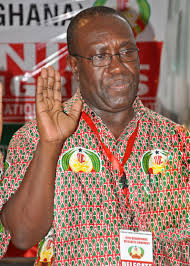…but says only if it will commit to repay
Government should tap into the Ghana Heritage Fund (GHF) if the going gets very tough, the Trades Unions Congress (TUC) has said – arguing that it is a better option than borrowing from other sources under the current coronavirus-induced economic crisis.
Ghana’s Gross Domestic Product (GDP) growth, which was projected at 6.8 percent prior to the pandemic, has been revised downward to 1.5 percent; and the TUC, which says an estimated GH¢18bllion is required to adequately offset the loss in productive activity, is urging government to explore diverse ways of injecting money into the economy – including the possibility of utilising the Heritage Fund.
“Given the severity of the current crisis, government should not hesitate to borrow funds from the Heritage Fund. What ought to be done is for government to treat any amount it withdraws as a loan to be repaid with the appropriate interest when the COVID-19 storm has passed.
“Borrowing from the Heritage Fund is better for us now and in future than borrowing from other sources. But we should replenish it for future crises,” it said in a report on its preliminary assessment of the impact of COVID-19.
In March this year, the Finance Minister, Ken Ofori-Atta, in an apparent attempt to test public patience, proposed utilising the fund to fight the pandemic. His proposal was however met with strong opposition from civil society organisations and economic experts.
For instance, the Institute for Energy Security (IES) strongly opposed the idea, saying that any attempt to tap into it cannot be justified; and as such, doing so would leave future generations with a burden too huge to carry.
“IES vehemently opposes government’s decision to drain the only fund intended to provide an endowment to support the development of unborn generations when the petroleum reserves have been depleted.
“Any attempt to get close to the Heritage Fund will be seen as an assault on the well-being of future generations, a wholesale theft of the prospects of generations to come; and as a result will be met with stiff resistance,” its Executive Director, Paa Kwasi Anamua Sakyi, said at the time.
Similarly, the Public Interest and Accountability Committee (PIAC), which acts as watchdog on how the country’s petroleum revenues are utilised, warned against government using the GHF to offset the devastating effects of the virus – arguing that the proposal could expose the Fund to future abuse. To PIAC, any amendment of the PRMA under the current circumstances would come across as a reactionary and risky option.
“Accessing the Heritage Fund will not only dim the spirit of the law, but also derail the country’s intended purpose of applying international best governance practices to our hydrocarbon resources,” PIAC said.
However, the TUC – which is the umbrella-body of 18-affiliate unions in the country – holds a different view, noting that given the size of loss in economic activity, government could utilise the fund; but only on condition that it will be replenished with all accompanying interest within a specified timeline.
“The coronavirus pandemic is undoubtedly the worst health crisis ever to hit the world in modern times. The scale of its economic and social costs is staggering. Businesses are closing down. Workers are losing their jobs and livelihoods. Households are struggling to feed themselves. Government is facing a drastic reduction in revenue and rising expenditure at the same time,” the report read.
Ghana Heritage Fund
The GHF was created to set aside a portion of petroleum revenue for the benefit of future generations. It was established under the Petroleum Revenue Management Act (PRMA) 2011, Act 815 and later Amended in 2015.
The main purpose of the GHF is to provide an endowment to support development for future generations when petroleum reserves have been depleted, and to receive excess petroleum revenue. Thus, the law intends to ensure that future generations are factored into using the country’s hydrocarbon resources in a sustainable manner.










